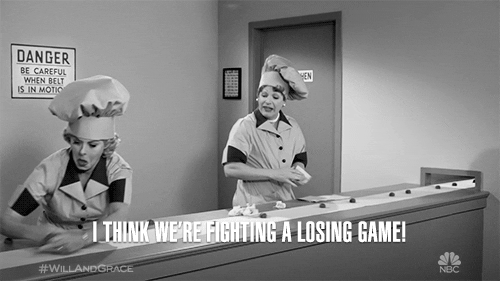
In a culture focused on success, achievement, and perfection, most people mistakenly think that striving and being constantly on the go is the only way to accomplish more and get the most out of their time. However, working round the clock is inefficient, and being constantly on the go isn’t the way to get the most out of our time. So, how can we overcome these strong social forces that tell us otherwise? By learning the art of “doing more by doing less.” (Estimated reading time: 9 minutes)
“Less is more. Progress is made through precise, persistent, and purposeful pushes.”
— Scott Perry
Time is a limited resource. We all wish we could have more of it, but ultimately, we must make do with the cards we are dealt. What we can do is maximize the precious hours that we’re given.
In a culture focused on success, achievement, and perfection, most people mistakenly think that striving and being constantly on the go is the only way to accomplish more. Just step into any busy street, train station, or airport, and you’ll witness the dizzying speed of urban life.
I have fallen prey to this kind of thinking. Not too long ago, I worked non-stop, with a schedule that did not leave any wiggle room for relaxation and play. My inner critic bellowed at me to compensate for the lost time I squandered in my 20s.
It took several spells of headaches and exhaustion for me to stop and take a breather. Deep down, I knew there had to be a better way of living. Life is not meant to be a tedious struggle, and I am not a machine running on unlimited fuel.
I started studying successful people with a healthy work-life balance who enjoy a high quality of life. It didn’t matter if they were early in their careers or seasoned professionals. What mattered was their mindset and how they managed to accomplish more.
In my observations, it became apparent that they shared a common ethos: “Do more by doing less.” Working round the clock is not an efficient way to use our time. Intervals of downtime and passivity is the grease that keeps the wheel going. Their lives mirrored this, and they followed a tempo of living that made them productive and happy at the same time.
That’s not what most of the population thinks. Since childhood, society has imbued us with the “worker bee” mentality. It convinces us to join the rat race. So, how can we overcome these strong social forces and accomplish more in a shorter time? First, by understanding how we got here in the first place.
The everyday hustler: living in a culture of “doers”

“Hustling” is a word deeply embedded in the zeitgeist. Whether we read it in an article in Entrepreneur magazine or hear it in a rap song, it has infiltrated our vernacular.
Although the original definition is to scam someone, hustling has become a word that describes the effort one must put in to get ahead. Anyone who wants to make it big in life, and accomplish more than the average person, must stay on the grind and work harder than everybody else.
Putting in extra hours and making sacrifices like spending less time with friends and on hobbies is the hustler’s way. When we stick with it, we’ll eventually be rewarded.
The term has been glorified, and those who succeeded are lauded for their relentless work ethic. Hustling has become a rite of passage for the power-hungry living in our capitalist society. Time is money, so don’t waste it on taking time out to unwind or, God forbid, to take a vacation.
In his book, “The Calm Company,” author Jason Fried writes:
“Long hours, excessive busyness, and lack of sleep have become a badge of honor for many people these days. Sustained exhaustion is not a badge of honor, it’s a mark of stupidity. Companies that force their crew into this bargain are cooking up dumb at their employee’s expense.”
The human species has always had a robust workforce that toiled in labor for long hours. However, as our civilizations became more advanced, the work has increased.
Here’s how many hours people from past eras worked:
Hunter-gatherer in Stone Age Europe: 3-5 hours a day / 365 days a year
Laborer in ancient Egypt: 8 hours a day /131 days a year
Peasant in medieval England: 8 hours a day / 150 days a year
Factory worker in mid-19th-century England: 16 hours a day / 311 days a year
An office worker in early 21st-century America: 6.9 hours a day / 239 days a year
Unlike our ancestors, we also have to deal with technology and global competition. If we’re not involved in exciting things (relaxing at the beach, rock climbing, attending events, etc.) that we can share loud and proud on our social media, we appear less appealing to others and irrelevant.
Having a jam-packed schedule filled with side hustles and escapades will cause us more harm than good in the long run. Whenever you say, “I’m too busy right now,” or “I have no time for anything,” know there’s nothing worthy of praise about that.
Slow it down: why doing less is a more effective

I can imagine that the concept of doing less to do more is going to get some pushback. After all, there’s just so much you want to do, and we have to give each endeavor all the time it needs to manifest.
While that’s true, it’s easy to forget one crucial fact: you’re not a machine.
You can’t sit for over eight hours in front of a screen and expect to produce high-quality work. Running from one thing to another also blurs your vision and doesn’t give you the time and space to question things and see the big picture.
The only result of living this way is burnout, exhaustion, low productivity, and disconnection. As a complex biological entity, you could do much better with a cycle that includes stimulation and rest. When we do this, we can experience benefits, like:
- More time to do things you enjoy and that feed your soul
- More time to spend with loved ones and nurture your connections
- Slowing down, finding pleasure in your work, and engaging your creativity
- Better health and stamina from a more balanced life
- Producing more impactful work that is recognized and rewarded
Being productive isn’t about freeing up more time to do more work but about doing less so we spend our energy on the right work and accomplish more. Luminaries like Darwin, Einstein, and Nietzsche only worked for a couple of hours but could produce ground-breaking work.
In Daoism, a Chinese philosophy, there is a principle called ‘Wu Wei,’ which means “effortless action” or “doing nothing.” Doing nothing does not imply that you shouldn’t do anything and fall into laziness. It simply means being at peace with a task. In this state, you can carry out that task with maximum efficiency. Wu Wei is about “being in the zone” or flow.
We can only experience Wu Wei when we have less on our plate. We must begin to find joy in eliminating the extra noise and stop tying our self-worth to how full our schedules are. Instead, let go of busyness and strategically center your life around what truly matters.
Work smarter: how to accomplish more by doing less

The key to getting more done by doing less (even if we have many responsibilities) is working smarter and becoming conscious of how we expand our time.
The “more” that we gain includes material and emotional wealth – the kind we get from fulfilling relationships, doing the things that light us up, and having enough breathing space.
Here’s how you can accomplish more in your life by pursuing less:
1. Consider The Law of Diminishing Returns before overworking
The Law of Diminishing Returns is an economic principle that states that, after a certain point, investing more in a process won’t continue to create the desired result (if other factors remain the same). This concept validates the idea that going for “good enough” is often a better strategy than an unhealthy push for perfection.
While working long hours on most days of the week sounds like a good idea to get ahead, the reality is that after we reach our threshold, our productivity and the quality of our work declines considerably. We’re better off cutting back our hours and getting the needed rest.
2. Track your hours and where you spend most of your time
The first step of living the “gaining more by doing less” philosophy is looking at how you spend your time and energy. Keep a journal in which you log your daily activities and how long you do them. This includes everything from Zoom meetings to scrolling your Instagram feed.
This will make you conscious of where you’re losing more hours and which activities you need to start limiting to free up time for things that would yield more. Perhaps checking your emails for a few minutes three times a day is sufficient instead of 10 minutes several times a day.
3. Prioritize what really matters and let go of the rest
Once you’re clear about where your time goes, the next thing to figure out is what you should be focusing on. We tend to fill our plates with tasks without stopping to question whether they should be occupying our time. At any stage of your life, only a few things really matter – focus on those and either eliminate the others or let them run on autopilot.
One way to whittle down your focus areas is by creating a priority list. Once you know your values, needs, goals, and vision, you can map out which tasks need your full attention and which ones you can put on the back burner. Ask, “Is this an essential task? “Does it serve what matters most to me?” “Does it bring me joy?” “Can I do this with little to no effort?”
4. Focus on single tasks and eliminate all distractions
There is a mistaken belief that we can accomplish more if we multitask. For example, many of us are guilty of checking our emails while waiting for people to arrive at a meeting.
However, plenty of recent studies show that doing too many things at once is detrimental to our cognitive abilities and productivity.
Multitasking can lead us to stretch ourselves too thin and leave us feeling scattered. The end result? You’ll feel frustrated and ineffective.
A better alternative is to focus on a single task at a time. To maintain focus and concentration, it’s crucial to eliminate all distractions that can interrupt you, like your phone and chatty people.
5. Work in intervals and sync with your body clock
One of the biggest causes of burnout is a demanding schedule that requires daylong dedicated focus. Taking frequent breaks allows your mind to get the rest it needs before resuming. This is similar to interval training while exercising, where we work intensely for a short period (it may range from 30-90 minutes) followed by an interval of rest and recovery.
We can also increase efficiency by syncing our biological clock to our daily schedule. If you find yourself saying, “Why am I feeling tired all the time?” that’s a tell-tale sign that you’re out of alignment with your body’s natural rhythms. By working with your body’s cycles, you’ll understand your natural peaks and valleys and harness your energy to pack more into your day.
6. Automate tasks and leverage other people
Automation is a process that you can set up to remove things from your task list, so you don’t have to spend too much time or energy on them. While a task still needs to be done, your involvement in it is either removed or significantly reduced. Some examples of this are online grocery shopping and automatic bill payments.
You can also leverage other people. This is especially helpful for activities you perceive as cumbersome and that don’t utilize your strengths. For instance, you can hire people to clean your home. If you’re setting up a website and need a new logo and lack graphic design skills, hiring talent to design it would save time and allow you to focus on other aspects of the site. Having the right leverage will enable you to accomplish more in less time.
Producing high-quality work in less time is simpler when we find an element of fun in what we do. As Mary Poppins says, “In every job that must be done. There is an element of fun. You find the fun and snap! The job’s a game.” Taking a light-hearted approach will enhance your life with magic and wonder.
All my best on your journey,
Seline

Question for you: What’s your favorite hack to accomplish more in a shorter time? In which aspect of your life is it most helpful?
Did you like this post? Sign up below, and I’ll send you more awesome posts like this every week.

Hey Seline – this is an interesting concept. It makes sense that we get so busy doing so much that none of it gets our full attention and we end up ‘spinning our wheels’ so much and don’t seem to get a lot of quality work done.
You have definitely given me something to think about here. Keep ’em coming!
I love all of thes blogs so much! There is so much to talk about and unpack in each one. Even if the topic doesn’t 100% relate to you, there usually is still something that you can pull from the piece and learn from. I love that!
Thanks, Maggie! That’s very kind of you.